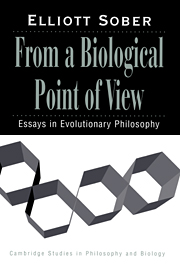Book contents
- Frontmatter
- Contents
- Acknowledgments
- Introduction
- 1 Did evolution make us psychological egoists?
- 2 Why not solipsism?
- 3 The adaptive advantage of learning and a priori prejudice
- 4 The primacy of truth-telling and the evolution of lying
- 5 Prospects for an evolutionary ethics
- 6 Contrastive empiricism
- 7 Let's razor Ockham's razor
- 8 The principle of the common cause
- 9 Explanatory presupposition
- 10 Apportioning causal responsibility
- 11 Evolution, population thinking, and essentialism
- 12 Temporally oriented laws
- Index
8 - The principle of the common cause
Published online by Cambridge University Press: 14 January 2010
- Frontmatter
- Contents
- Acknowledgments
- Introduction
- 1 Did evolution make us psychological egoists?
- 2 Why not solipsism?
- 3 The adaptive advantage of learning and a priori prejudice
- 4 The primacy of truth-telling and the evolution of lying
- 5 Prospects for an evolutionary ethics
- 6 Contrastive empiricism
- 7 Let's razor Ockham's razor
- 8 The principle of the common cause
- 9 Explanatory presupposition
- 10 Apportioning causal responsibility
- 11 Evolution, population thinking, and essentialism
- 12 Temporally oriented laws
- Index
Summary
In The Direction of Time, Hans Reichenbach (1956) stated a principle that he thought helps guide nondeductive inference from an observed correlation to an unobserved cause. He called it the principle of the common cause. Wesley Salmon (1975, 1978, 1984) subsequently elaborated and refined this idea.
Reichenbach thought that philosophy had not sufficiently attended to the fact that quantum mechanics had dethroned determinism. His principle was intended to give indeterminism its due; the principle bids one infer the existence of a cause, but the cause is not thought of as part of a sufficient deterministic condition for the effects. It is ironic that as plausible as Reichenbach's principle has seemed when applied to macro-level scientific phenomena and to examples from everyday life, it has been refuted by ideas stemming from quantum mechanics itself. The very idea that Reichenbach wanted to take seriously has come to be seen as his idea's most serious problem.
In the light of this difficulty, Salmon (1984) has modified his endorsement of the principle. It applies, not to all observed correlations, but to correlations not infected with quantum mechanical weirdness. Salmon's fallback position has been that Reichenbach's principle would have been quite satisfactory, if quantum mechanics had not made such a hash of our “classical” picture of causality.
Information
- Type
- Chapter
- Information
- From a Biological Point of ViewEssays in Evolutionary Philosophy, pp. 158 - 174Publisher: Cambridge University PressPrint publication year: 1994
Accessibility standard: Unknown
Why this information is here
This section outlines the accessibility features of this content - including support for screen readers, full keyboard navigation and high-contrast display options. This may not be relevant for you.Accessibility Information
- 1
- Cited by
